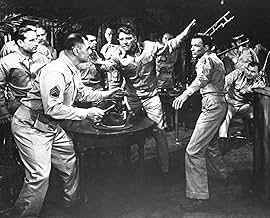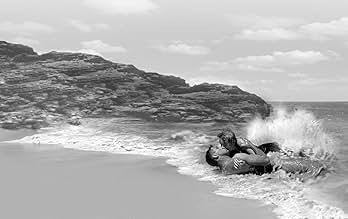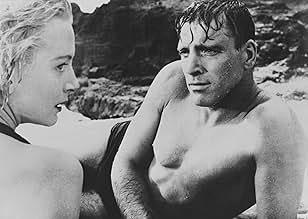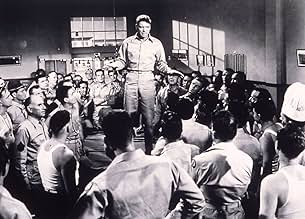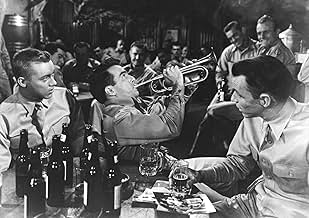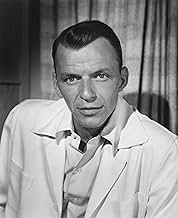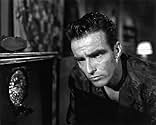NOTE IMDb
7,6/10
53 k
MA NOTE
À Hawaï, en 1941, un soldat est cruellement puni pour avoir refusé de boxer dans l'équipe de son régiment, tandis que la femme de son capitaine et son adjoint tombent amoureux.À Hawaï, en 1941, un soldat est cruellement puni pour avoir refusé de boxer dans l'équipe de son régiment, tandis que la femme de son capitaine et son adjoint tombent amoureux.À Hawaï, en 1941, un soldat est cruellement puni pour avoir refusé de boxer dans l'équipe de son régiment, tandis que la femme de son capitaine et son adjoint tombent amoureux.
- Réalisation
- Scénario
- Casting principal
- Récompensé par 8 Oscars
- 26 victoires et 9 nominations au total
Claude Akins
- Sgt. 'Baldy' Dhom
- (non crédité)
Vicki Bakken
- Suzanne
- (non crédité)
Margaret Barstow
- Roxanne
- (non crédité)
Avis à la une
... from what we feed on these days and perhaps only of relevance as an artefact of the time it was released and the period it reflects, the way we behave and interact in the real world has changed unrecognisably since. It does, however, deliver us some top drawer performances from some genuinely talented performers, most of them to go on to much bigger and better things. All in all, a solid 1950s era film set in the prior decade before the outbreak of war, it uses multiple and interlinked sub plots to show us the sorrow and sadness experienced by numerous characters as a result of the choices they've made, the people they met and how they interacted.
One of the big blockbuster best sellers of the post World War II years is James Jones's From Here to Eternity, a tale of the peacetime army in Hawaii before Pearl Harbor. The book was definitely going to be made into a film and it was only a question of casting to make it a success.
Director Fred Zinneman had a good intuitive sense about casting here, even against type. The two principal female parts were done against type. Deborah Kerr who made a career of playing respectable women played a captain's wife who's drinking and playing around. Not that husband Philip Ober is letting grass grow under his feet either, but Kerr's latest sexual exploit involves her with the First Sergeant of her husband's company, Burt Lancaster.
Donna Reed, who up to that point was best known for being Mary Bailey in It's A Wonderful Life, plays a prostitute here. A girl from the wrong side of the tracks, jilted by a rich boyfriend stateside, she's in Hawaii to make money and then go home and buy some respectability. She's not looking for romance with any soldiers, but you can't plan these things.
Especially Montgomery Clift if he comes in your life. It's been argued that this is Clift's greatest role and a case can sure be made for it. His character of Robert E. Lee Pruitt is like so many who still join the army today, from small town America who have no future there and find a home in the Armed Services. What makes Clift unique is that strong sense of individualism he can't control in an organization that does not encourage individuality.
Clift and Lancaster are a great study in contrasts and that's what drives From Here to Eternity. Lancaster as Sergeant Milt Warden is the ultimate professional soldier, held in the highest regard by his men. Lancaster is someone who knows how to work the system, you see it in the way he manipulates his captain. Of course he's got to be a manipulator there since he's having an affair with Deborah Kerr. He tries to protect Clift from himself and ultimately fails.
Clift has transferred into an infantry company and he was at one time a boxer. But he blinded someone in a fight and quit boxing. Philip Ober who prides himself on having several champions in various weight classes worked to get Clift in his company. Clift upsets his plans by refusing to box so he has the various sergeants give him "the treatment."
Clift's best friend in the company is a tough street wise soldier from the big city named Angelo Maggio, played by Frank Sinatra. Sinatra read the book and knew this part was for him. He did everything he had to do to get that part, including working for scale. At the time Sinatra was considered a has been as singer and actor. Sinatra was right on the money in terms of picking a role. His faith in himself and Columbia Pictures and Fred Zinneman's faith in him netted him an Oscar for Best Supporting Actor, one of eight awards won by From Here to Eternity.
By the way Sinatra credited both Lancaster and Clift in helping him through this film as a dramatic actor. Lancaster and Sinatra didn't inhabit the same Hollywood orbit, but they remained friends for life. The same could not be said for Clift. Allegedly, some five or six years after From Here to Eternity and after Monty Clift's automobile accident while shooting Raintree County, Clift at some party at Sinatra's made a drunken pass at one of Sinatra's retainers. That got him kicked out of Sinatra's circle permanently.
In fact From Here to Eternity was also the Best Picture of 1953, with Zinneman getting his second Best Director Oscar in a row after the one he took home in 1952 for High Noon. Donna Reed won for Best Supporting Acress. Burt Lancaster and Montgomery Clift were both nominated for Best Actor, but split the vote allowing William Holden to win for Stalag 17. Another great acting job itself. And Kerr was up for Best Actress, but lost to Audrey Hepburn for Roman Holiday.
From Here to Eternity is a film loaded with good actors in small roles who got their first notice in this film. Ernest Borgnine, Robert J. Wilkie, Claude Akins, Jack Warden, Mickey Shaughnessy, all play various soldiers and each one is memorable. Especially Borgnine as the vicious sadistic sergeant of the stockade.
TV's Superman was in From Here to Eternity also. George Reeves who was looking to escape the typecasting from Superman has a part as another sergeant who warns Lancaster about Deborah Kerr. He gave a fine performance, but most of it wound up on the cutting room floor. That would have unforeseen tragic consequences.
This is not any kind of glamorous army. These people are all too real and not very noble. The original novel was toned down quite a bit for the screen. But when the attack on Pearl Harbor comes, the men rise to the occasion, do their jobs in a more than competent manner and led by Burt Lancaster in that company. It's these men who won that war in the Pacific and the one in Europe as well and From Here to Eternity despite the less than noble portrayals of them as individuals is a great tribute to them as a team.
Director Fred Zinneman had a good intuitive sense about casting here, even against type. The two principal female parts were done against type. Deborah Kerr who made a career of playing respectable women played a captain's wife who's drinking and playing around. Not that husband Philip Ober is letting grass grow under his feet either, but Kerr's latest sexual exploit involves her with the First Sergeant of her husband's company, Burt Lancaster.
Donna Reed, who up to that point was best known for being Mary Bailey in It's A Wonderful Life, plays a prostitute here. A girl from the wrong side of the tracks, jilted by a rich boyfriend stateside, she's in Hawaii to make money and then go home and buy some respectability. She's not looking for romance with any soldiers, but you can't plan these things.
Especially Montgomery Clift if he comes in your life. It's been argued that this is Clift's greatest role and a case can sure be made for it. His character of Robert E. Lee Pruitt is like so many who still join the army today, from small town America who have no future there and find a home in the Armed Services. What makes Clift unique is that strong sense of individualism he can't control in an organization that does not encourage individuality.
Clift and Lancaster are a great study in contrasts and that's what drives From Here to Eternity. Lancaster as Sergeant Milt Warden is the ultimate professional soldier, held in the highest regard by his men. Lancaster is someone who knows how to work the system, you see it in the way he manipulates his captain. Of course he's got to be a manipulator there since he's having an affair with Deborah Kerr. He tries to protect Clift from himself and ultimately fails.
Clift has transferred into an infantry company and he was at one time a boxer. But he blinded someone in a fight and quit boxing. Philip Ober who prides himself on having several champions in various weight classes worked to get Clift in his company. Clift upsets his plans by refusing to box so he has the various sergeants give him "the treatment."
Clift's best friend in the company is a tough street wise soldier from the big city named Angelo Maggio, played by Frank Sinatra. Sinatra read the book and knew this part was for him. He did everything he had to do to get that part, including working for scale. At the time Sinatra was considered a has been as singer and actor. Sinatra was right on the money in terms of picking a role. His faith in himself and Columbia Pictures and Fred Zinneman's faith in him netted him an Oscar for Best Supporting Actor, one of eight awards won by From Here to Eternity.
By the way Sinatra credited both Lancaster and Clift in helping him through this film as a dramatic actor. Lancaster and Sinatra didn't inhabit the same Hollywood orbit, but they remained friends for life. The same could not be said for Clift. Allegedly, some five or six years after From Here to Eternity and after Monty Clift's automobile accident while shooting Raintree County, Clift at some party at Sinatra's made a drunken pass at one of Sinatra's retainers. That got him kicked out of Sinatra's circle permanently.
In fact From Here to Eternity was also the Best Picture of 1953, with Zinneman getting his second Best Director Oscar in a row after the one he took home in 1952 for High Noon. Donna Reed won for Best Supporting Acress. Burt Lancaster and Montgomery Clift were both nominated for Best Actor, but split the vote allowing William Holden to win for Stalag 17. Another great acting job itself. And Kerr was up for Best Actress, but lost to Audrey Hepburn for Roman Holiday.
From Here to Eternity is a film loaded with good actors in small roles who got their first notice in this film. Ernest Borgnine, Robert J. Wilkie, Claude Akins, Jack Warden, Mickey Shaughnessy, all play various soldiers and each one is memorable. Especially Borgnine as the vicious sadistic sergeant of the stockade.
TV's Superman was in From Here to Eternity also. George Reeves who was looking to escape the typecasting from Superman has a part as another sergeant who warns Lancaster about Deborah Kerr. He gave a fine performance, but most of it wound up on the cutting room floor. That would have unforeseen tragic consequences.
This is not any kind of glamorous army. These people are all too real and not very noble. The original novel was toned down quite a bit for the screen. But when the attack on Pearl Harbor comes, the men rise to the occasion, do their jobs in a more than competent manner and led by Burt Lancaster in that company. It's these men who won that war in the Pacific and the one in Europe as well and From Here to Eternity despite the less than noble portrayals of them as individuals is a great tribute to them as a team.
The folks who made PEARL HARBOR should have done their homework on how to bring a personal romance into a historical event. This film should have been at the top of their list.
The Pearl Harbor attack is the climax of the film as well as of the various intricate human relationships in the film. This is a classic piece of romantic history, and the beach scene is probably one of the most erotic ever done -- all the more impressive because it has no nudity.
This is a real saga of human passion and how it is affected by history. Whether you see PEARL HARBOR or not is up to you. But definitely see this film.
The Pearl Harbor attack is the climax of the film as well as of the various intricate human relationships in the film. This is a classic piece of romantic history, and the beach scene is probably one of the most erotic ever done -- all the more impressive because it has no nudity.
This is a real saga of human passion and how it is affected by history. Whether you see PEARL HARBOR or not is up to you. But definitely see this film.
It's often said that the simplest stories are the best. This isn't true. The simple stories are easy to get right, but a complex ensemble piece with multiple protagonists and numerous subplots can be just as effective, although it's a lot harder to pull off successfully. From Here to Eternity stands in the tradition of The Best Years of Our Lives, Seven Samurai and The Godfather, of pictures with interwoven plots that have become classics thanks to strong screen writing, intelligent direction and powerful acting performances.
Part of the reason From Here to Eternity works is because it is very quick in establishing its characters and plot lines. It opens with a series of interlinking scenes, introducing us to Montgomery Clift, Frank Sinatra, Philip Ober, Burt Lancaster and Deborah Kerr, giving us clues about Clift's past and hinting at the future relationship between Lancaster and Kerr, all in the space of five minutes. Director Fred Zinnemann, with a confidence that is lacking in his earliest features, shoots these scenes with subtle technique to give them maximum storytelling effect. For example, he gives Clift's character a superb introduction, walking at a right angle to the marching column until he is brought right into close-up. Once the dialogue begins he uses sudden changes of angle to highlight certain lines, for example the close-up of Lancaster telling Kerr "I'd be happy to help", at which point the audience know exactly what is going to happen between those two characters. Donna Reed is of course introduced a little later, but to compensate she is given a very distinctive first shot, framed on her own immediately after some busy crowd shots.
But Zinnemann's direction isn't all pure functionalism. He makes sparing use of attention-grabbing stylisation when the moment demands it, such as the dolly-out through the rain-soaked window during Lancaster and Kerr's first kiss. And this stylisation even helps keep the narrative together, for example cutting from the roaring sea at the end of the famous beach scene to the smoke rising from Clift's cigarette. Throughout the various parallel plots there is a tone of melancholy and regret, and Zinnemann keeps this commonality with his consistency of style.
Of course, you get the same problem or at least the same feature in From Here to Eternity as you do in They Died with Their Boots on or Titanic, in that the audience, knowing their history, know what is going to happen at the end. The strength of the non-combat story lines is such that we forget when and where we are, and as such it is important that we are eased into the finale of the Pearl Harbour attack so it does not seem such a surreal break in tone. This is done with characteristic subtlety, with two objects placed noticeably yet not obtrusively into the frame to jog our memories. The first is a calendar showing December 6th on the wall beside Burt Lancaster, and the other a signpost reading "Pearl Harbour" after his final meeting with Kerr.
One of the biggest challenges for the makers of an ensemble piece is that you need a larger than normal pool of leading players, and yet you must ensure none of them will overshadow the others. This is another thing they got right in From Here to Eternity. Clift, Kerr and Lancaster are all competent performers without big egos, and they all give steady performances, even if they are far from career-bests. As to Sinatra, what's amazing is not the quality of his performance (it was always evident he could act) but that he was even allowed to play a dramatic, non-musical role. It just goes to show the increased flexibility of cinema in the 1950s, as well as the rising status of the musical genre. To give it some perspective, can you imagine Fred Astaire or Bing Crosby having done the same thing in the 30s? From Here to Eternity won 1953's Best Picture Oscar, and like all successful pictures was followed by a host of imitators. 1955's Battle Cry for example is another many-stranded story about soldiers at the start of World War Two, and even features a rather tepid knock-off of the famous beach scene. However, while Battle Cry has some nice moments, structurally it is an absolute mess, an example of how easy it is to do a botch job on a complex storyline. That's why From Here to Eternity is such a rarity, being an ensemble piece that really works.
Part of the reason From Here to Eternity works is because it is very quick in establishing its characters and plot lines. It opens with a series of interlinking scenes, introducing us to Montgomery Clift, Frank Sinatra, Philip Ober, Burt Lancaster and Deborah Kerr, giving us clues about Clift's past and hinting at the future relationship between Lancaster and Kerr, all in the space of five minutes. Director Fred Zinnemann, with a confidence that is lacking in his earliest features, shoots these scenes with subtle technique to give them maximum storytelling effect. For example, he gives Clift's character a superb introduction, walking at a right angle to the marching column until he is brought right into close-up. Once the dialogue begins he uses sudden changes of angle to highlight certain lines, for example the close-up of Lancaster telling Kerr "I'd be happy to help", at which point the audience know exactly what is going to happen between those two characters. Donna Reed is of course introduced a little later, but to compensate she is given a very distinctive first shot, framed on her own immediately after some busy crowd shots.
But Zinnemann's direction isn't all pure functionalism. He makes sparing use of attention-grabbing stylisation when the moment demands it, such as the dolly-out through the rain-soaked window during Lancaster and Kerr's first kiss. And this stylisation even helps keep the narrative together, for example cutting from the roaring sea at the end of the famous beach scene to the smoke rising from Clift's cigarette. Throughout the various parallel plots there is a tone of melancholy and regret, and Zinnemann keeps this commonality with his consistency of style.
Of course, you get the same problem or at least the same feature in From Here to Eternity as you do in They Died with Their Boots on or Titanic, in that the audience, knowing their history, know what is going to happen at the end. The strength of the non-combat story lines is such that we forget when and where we are, and as such it is important that we are eased into the finale of the Pearl Harbour attack so it does not seem such a surreal break in tone. This is done with characteristic subtlety, with two objects placed noticeably yet not obtrusively into the frame to jog our memories. The first is a calendar showing December 6th on the wall beside Burt Lancaster, and the other a signpost reading "Pearl Harbour" after his final meeting with Kerr.
One of the biggest challenges for the makers of an ensemble piece is that you need a larger than normal pool of leading players, and yet you must ensure none of them will overshadow the others. This is another thing they got right in From Here to Eternity. Clift, Kerr and Lancaster are all competent performers without big egos, and they all give steady performances, even if they are far from career-bests. As to Sinatra, what's amazing is not the quality of his performance (it was always evident he could act) but that he was even allowed to play a dramatic, non-musical role. It just goes to show the increased flexibility of cinema in the 1950s, as well as the rising status of the musical genre. To give it some perspective, can you imagine Fred Astaire or Bing Crosby having done the same thing in the 30s? From Here to Eternity won 1953's Best Picture Oscar, and like all successful pictures was followed by a host of imitators. 1955's Battle Cry for example is another many-stranded story about soldiers at the start of World War Two, and even features a rather tepid knock-off of the famous beach scene. However, while Battle Cry has some nice moments, structurally it is an absolute mess, an example of how easy it is to do a botch job on a complex storyline. That's why From Here to Eternity is such a rarity, being an ensemble piece that really works.
James Jone's novel was deemed impossible to put onto the screen {how many times have we heard that one before?}, but nobody told director Fred Zinnerman and the cast of dreams. Troubles with the making of the film were many, the film was thwarted by a censorship requirement that the army not be portrayed as careless and over brutal, and some of the sexual themes from the novel had to be toned down. Zinneman also had to fight a continuous battle with Columbia's head ego tripper Harry Cohn. He interfered with every script that was shown to him, and casting was also a tough thing to achieve with Cohn trying to call the shots. As it turned out we got one of the best composition of actors in one film to have ever graced the screen.
From Here To Eternity is a film about the lives and loves of a number of characters at Schofield Barracks-Pearl Harbor, just prior to the infamous attack by the Japanese that changed WW2. Illicit affairs, friendship, nobility, bravery and cruelty come crashing together in one gigantic lavish production that defines the word classic. Burt Lancaster, Montgomery Clift, Frank Sinatra, Ernest Borgnine, Jack Warden, Deborah Kerr, and Donna Reed all give performances that any other actor would be proud to have given. On another day they all could have won awards such was the strength of performance they all gave. Reed & Sinatra won best supporting Oscars, while Fred Zinneman rightly won for best director to cement the film winning outright for best picture. Yet the film's crowning glory didn't win an award, for to me, Montogomery Clift gives one of the best performances in motion picture history, it's layered to perfection and it's one of those character portrayals that has me involved to the point of exhaustion. One scene in which he plays a bugle lament as tears roll down his face is just stunning, and I know how he feels because I cry along with him to, such is my involvement with his turn as Robert E. Lee Prewitt.
Laced with memorable scenes {the kiss, the bugle lament, Lancaster blasting away at the Japanese planes with machine gun in hand}, and performances to match, From Here To Eternity is essential cinema to be viewed every year and homaged and praised whenever possible. 10/10 in every single respect.
From Here To Eternity is a film about the lives and loves of a number of characters at Schofield Barracks-Pearl Harbor, just prior to the infamous attack by the Japanese that changed WW2. Illicit affairs, friendship, nobility, bravery and cruelty come crashing together in one gigantic lavish production that defines the word classic. Burt Lancaster, Montgomery Clift, Frank Sinatra, Ernest Borgnine, Jack Warden, Deborah Kerr, and Donna Reed all give performances that any other actor would be proud to have given. On another day they all could have won awards such was the strength of performance they all gave. Reed & Sinatra won best supporting Oscars, while Fred Zinneman rightly won for best director to cement the film winning outright for best picture. Yet the film's crowning glory didn't win an award, for to me, Montogomery Clift gives one of the best performances in motion picture history, it's layered to perfection and it's one of those character portrayals that has me involved to the point of exhaustion. One scene in which he plays a bugle lament as tears roll down his face is just stunning, and I know how he feels because I cry along with him to, such is my involvement with his turn as Robert E. Lee Prewitt.
Laced with memorable scenes {the kiss, the bugle lament, Lancaster blasting away at the Japanese planes with machine gun in hand}, and performances to match, From Here To Eternity is essential cinema to be viewed every year and homaged and praised whenever possible. 10/10 in every single respect.
Oscars Best Picture Winners, Ranked
Oscars Best Picture Winners, Ranked
See the complete list of Oscars Best Picture winners, ranked by IMDb ratings.
Le saviez-vous
- AnecdotesMontgomery Clift threw himself into the character of Prewitt, learning to play the bugle (even though he knew he'd be dubbed) and taking boxing lessons. Fred Zinnemann said, "Clift forced the other actors to be much better than they really were. That's the only way I can put it. He got performances from the other actors, he got reactions from the other actors that were totally genuine."
- GaffesThe impromptu bugle solo in the club includes notes that only a trumpet could hit.
- Citations
Robert E. Lee "Prew' Prewitt: Nobody ever lies about being lonely.
- Crédits fousOpening credits prologue: SCHOFIELD BARRACKS HAWAII 1941
- ConnexionsEdited from Pearl Harbour (1943)
- Bandes originalesRe-enlistment Blues
(1953)
by James Jones, Fred Karger, Robert Wells
Sung by men in the barracks twice
Played often in the score
Meilleurs choix
Connectez-vous pour évaluer et suivre la liste de favoris afin de recevoir des recommandations personnalisées
Détails
- Date de sortie
- Pays d’origine
- Langue
- Aussi connu sous le nom de
- De aquí a la eternidad
- Lieux de tournage
- Halona Beach Cove, O'ahu, Hawaï, États-Unis(Warden and Karen's kissing in the surf scene)
- Société de production
- Voir plus de crédits d'entreprise sur IMDbPro
Box-office
- Budget
- 1 650 000 $US (estimé)
- Montant brut aux États-Unis et au Canada
- 36 416 $US
- Week-end de sortie aux États-Unis et au Canada
- 18 176 $US
- 7 déc. 2003
- Montant brut mondial
- 36 416 $US
- Durée
- 1h 58min(118 min)
- Couleur
- Mixage
- Rapport de forme
- 1.37 : 1
Contribuer à cette page
Suggérer une modification ou ajouter du contenu manquant



